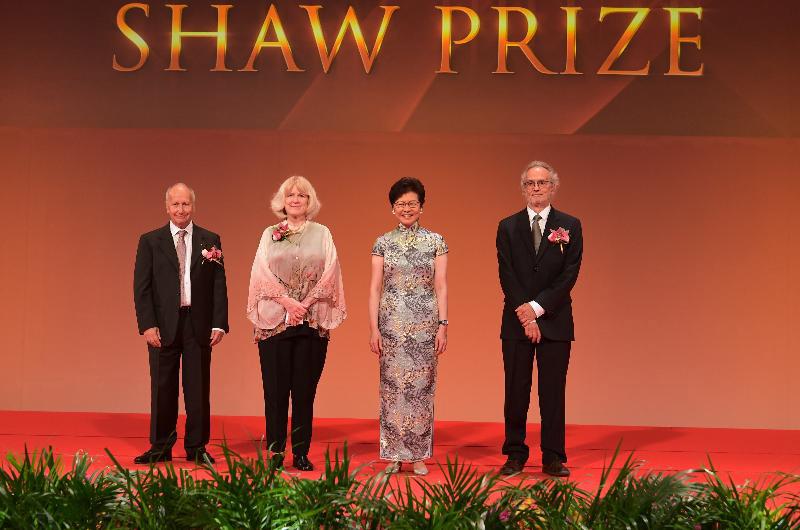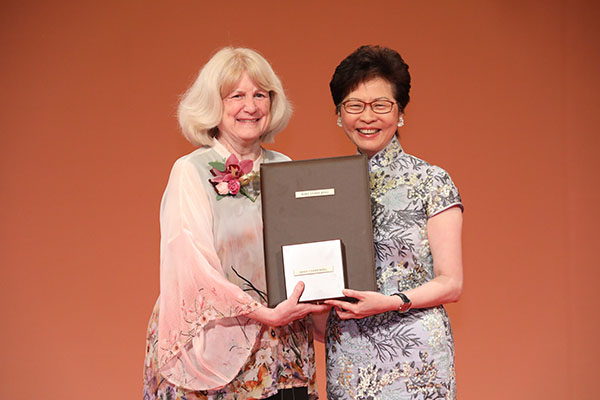The Shaw Prize in Life Science and Medicine 2018 is awarded to Mary-Claire King
- admin
- 2018-09-27
- News, Other news
Wednesday, 26 September 2018. At today’s presentation ceremony of The Shaw Prize at the Hong Kong Convention and Exhibition Centre, the Honourable Mrs Carrie Lam Cheng Yuet-ngor, Chief Executive of the HKSAR, People’s Republic of China, presented the awards to the three Laureates.
The Shaw Prize in Life Science and Medicine 2018 is awarded to Mary-Claire King, American Cancer Society Professor, Departments of Medicine and Genome Sciences at the University of Washington, USA, for her mapping of the first breast cancer gene. Using mathematical modeling, King predicted and then demonstrated that breast cancer can be caused by a single gene. She mapped the gene which facilitated its cloning and has saved thousands of lives.
King has spent most of her career addressing the epidemiology of cancer. A remarkable insight launched her efforts. It was well known that there are differences between populations in the incidence of the identical cancer. While other scientists did not pay particular attention to this fact, King surmised that there must be a gene involved and a genetic strategy could be successful to discover it. She committed to this line of attack despite overwhelming skepticism from cancer researchers. Breast cancer is a common complex disease, and the prevailing view was that such diseases arise from interactions among multiple genetic and environmental factors. But Mary-Claire was intrigued by hints that there might be inherited forms of the disease and beginning in 1974, long before there were genomic tools for human genetic analysis, she tested this head-on by studying over 1500 families in which multiple members were affected by breast cancer. Using a mathematical approach, she predicted that clustering of cases could be best explained by the presence of a disease gene in about ~ 4% of families. She also used data from young and old affected and unaffected individuals and predicted that among women carrying mutations in the gene, the risk of breast cancer was about 80% by age 70 whereas the risk decreased to 8% among women without the susceptibility allele. The field was quite skeptical about her mathematical model so she set out to show that indeed there is a breast cancer gene by locating in, physically to its chromosomal home. She worked with families with especially high incidence of breast cancer. Using linkage analysis, King mapped the gene, which she named BRCA1, to human chromosome 17 (band q21) in 1990.
Her announcement revolutionized an entire field. Geneticists who had dismissed the notion that a disease as complex as breast cancer could be linked to any one gene started efforts to clone the gene. King subsequently showed that the risks of breast and ovarian cancer among women with mutations in BRCA1 are very high — up to 80% lifetime risk for breast cancer and 50% lifetime risk for ovarian cancer — and have increased over the decades for non-genetic reasons. King’s dogma-overturning finding launched an international race to clone the gene. Her discovery of the existence of a gene driving breast cancer was key to the final cloning of the gene. King changed the way we think about non-Mendelian diseases and she alone inspired the cloning race, and moreover, pinpointed exactly what gene needed to be cloned. More recently, her group developed a multi-gene platform (named BROCA, in honour of the 19th century French surgeon who first described familial breast cancer) to simultaneously detect all classes of mutations in all breast and ovarian cancer genes. This platform has now been put into widespread clinical use. As a direct result of her efforts, there exist tests for the BRCA1 mutation. These tests have saved and prolonged the lives of countless women around the world.
King’s approach to gene discovery is a model for the detection of severe mutations in common complex diseases. The paradigm is to identify rare families in which the complex disease characteristics are inherited. Identification of the gene critical to the disease pathology in such families both reveals disease mechanisms and provides the genetic basis for identification of mutations in patients with little or no family history of the disease. In addition to being applied to millions of women world-wide at risk of breast and ovarian cancer, this approach has been the basis for gene discovery in diabetes, colon cancer, coronary artery disease, hypertension, Alzheimer’s disease, Parkinson’s disease and other complex traits.

The Hon Mrs Carrie Lam Cheng Yuet-ngor taking group photo with Laureates 2018 on stage at the Award Presentation Ceremony 2018

Professor Mary-Claire King, Shaw Laureates in Life Science and Medicine 2018
Source:The Shaw Prize Foundation
